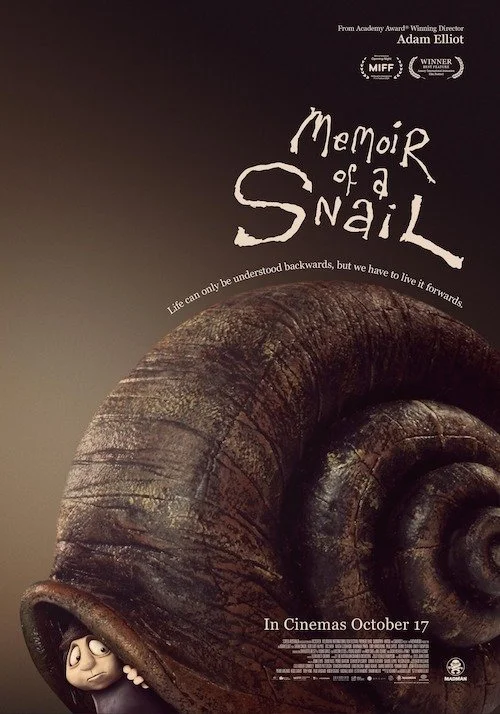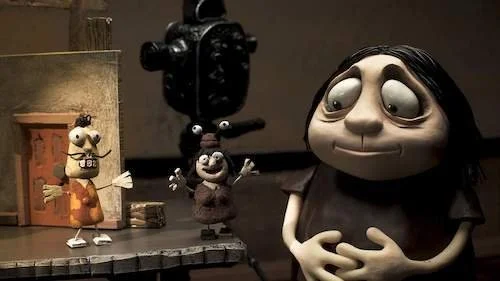Memoir of a Snail
Written by Andreas Babiolakis
Adam Elliot’s last feature length film, Mary and Max, has spellbound audiences since its release in 2008. Since then, we’ve had one short film, Ernie Biscuit, in 2015, but even then it’s been nine years since that came out. Finally, Elliot’s followup feature, Memoir of a Snail, is here, and you can see all of the blood, sweat, and tears (and you can estimate how many hours — nay, years — this project took) poured into each and every frame of this stop-motion release. Known for his mature, tragicomedy works that have — what he calls — chunky designs of characters with blatant quirks or flaws within dismal settings, Elliot’s films have resonated with audiences for years because of their ability to embrace the loneliness and anxiety of all misfits and underdogs. It has been sixteen years since Mary and Max, but Elliot’s style has not changed one bit. You may think that a lack of transition would be a bad trait, but in the case of Elliot’s beloved aesthetic, we could use his bittersweet warmth now more than ever during these uncertain and shaky times.
Like in most of Elliot’s works, we follow a neglected protagonist experiencing existential dread. This time, it’s Grace Pudel (Sarah Snook of Succession fame): a fraternal twin to Gilbert (Academy Award nominee Kodi Smit-McPhee). Grace and Gilbert were separated at a young age by child’s services due to the tragic passing of their parents. Gilbert, now on an apple farm run by religious extremists, is going to do whatever it takes to find Grace again. However, this isn’t Gilbert’s story: this is Grace’s. We see how her traumatic childhood has affected her: she has become a hermit who hoards junk and hides from conflict. Her late mother had a fascination for snails. Grace was born with a cleft lip and was bullied as a child, being called a “rabbit” due to her appearance. She identified with another animal instead: her mother’s favourite snails. With her snail hat and a collection of all things malacological, Grace feels protected. Really, she is stunted.
During an interview I had with him, Elliot brought up his fascination with a quote by philosopher Soren Kierkegaard, which you can even find both within the film and on the film’s poster: “Life can only be understood backwards, but we have to live it forwards.” The majority of Memoir of a Snail is being told by Grace to her favourite snail, Sylvia, after what appears to be yet another tragedy at the start of the film: a death of a woman (but, who is this person?). We learn about Grace, her history, her vices, and more (including who the mysterious woman at the start of the film is). Grace hasn’t had many friends outside of Sylvia, brother Gilbert, and the eccentric Pinky (Australian icon Jacki Weaver), the latter being a much older person who has led a very bizarre but exhilarating life (which is a message that Grace can learn from).
Parts of Memoir of a Snail feel autobiographical and cathartic to Adam Elliot.
While a bonkers, exaggerated look at society’s woes, much of Memoir of a Snail feels exact, and I’d argue all of it feels truthful. It’s easy to see in which ways the film feels autobiographical to Elliot, and this stems much farther than just his affinity for what happens to be a magnificent quote (I understand his love for it). Grace aspires to be a stop-motion animator; however, in this film, she cannot get out of the funk of being alive and weighed down by depression. There’s also a subplot involving societal scorn towards homosexuality; I’d love to think Elliot has never experienced such bigotry in his life, but it’s hard not to think that this storyline stems from the kinds of hatred he’s had to endure. Otherwise, much of Memoir of a Snail feels like kooky extensions of the hardships we go through as human beings, including deaths and injuries in extreme ways, cartoonish depictions of horror (the obsessive chanting by Gilbert’s new, abusively religious family, sounds like babbling), and comedy used to punctuate the more twisted moments (view these sequences as coping mechanisms).
What I appreciate the most about Memoir of a Snail’s style is that any sadness is usually internalized, so no one is outwardly bawling and screaming their emotions. For the most part, depression can be read on the faces of the broken spirits, particularly poor little Gracie who shattered my heart throughout the film (if there is any merchandise, I would absolutely buy a Grace doll, because I felt such a connection with her). As she sits in silence with little tears welling up in her eyes, Grace doesn’t have to say anything in order for you to know how she is coping (or, rather, not). While Memoir of a Snail can occasionally feel like the randomness of life where not everything has meaning in what defines you as a person, the majority of the film shapes Grace perfectly so we understand her character and mindset. With a major twist towards the end of the film that I won’t reveal, I feel like Elliot is responding to what the hard work of others looks like when we are stuck in the doldrums: as if miracles happened by magic. We don’t need to see every step of the way to know that someone never gave up. No one is focusing on all of the things we do to get somewhere; they only see the end result.
This is extremely valuable for Grace who is caught in a downward spiral, and Memoir of a Snail leaves us with the promise that when we bump into Grace again some day, we’ll see how much progress she’s made. With a bit of an abrupt ending, I feel like Adam Elliot is telling us that — should we be in a similar position as Grace and in need of a turning point — that tomorrow starts right now. We can no longer wait for good to happen to us. We have to make it ourselves. The world is a cruel place, but it is up to us to make it better as a whole, and for ourselves. Elliot has done as such with the adorable, deranged, lovable Memoir of a Snail. If he and his team could plug years into making this ninety minute feature (one that is dazzling to watch), you can also get out of your despair. Of course, it isn’t as easy as just doing so, and Elliot never lies to you that it is. He understands that depression is a mighty beast, and some wins are the small victories that just help us get to the end of the day; these matter, too. A snail crawls at a very slow pace. They cannot go backwards; only forwards (although they apparently tend to get stuck in circles sometimes, according to Elliot). Despite being caught in a loop, they are still moving forwards, even if ever so glacially. If you cannot be a superhero, being a snail is enough, and that’s a valuable lesson many of us could use in 2024 thanks to Elliot’s latest, wonderful film.
Andreas Babiolakis has a Masters degree in Film and Photography Preservation and Collections Management from Toronto Metropolitan University, as well as a Bachelors degree in Cinema Studies from York University. His favourite times of year are the Criterion Collection flash sales and the annual Toronto International Film Festival.






